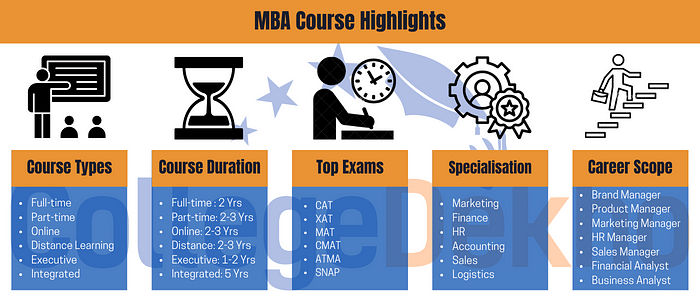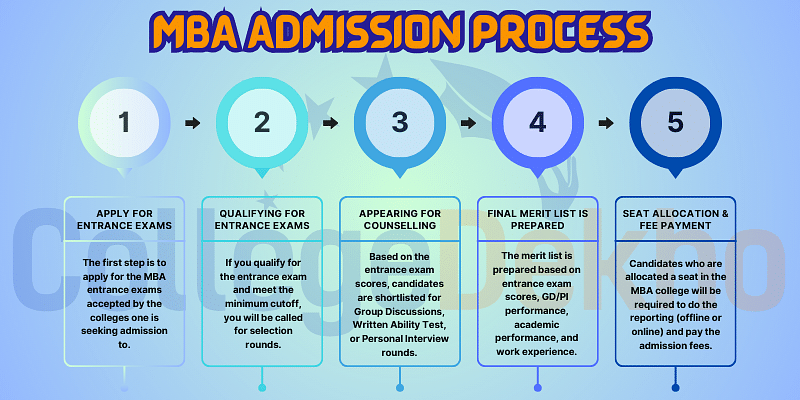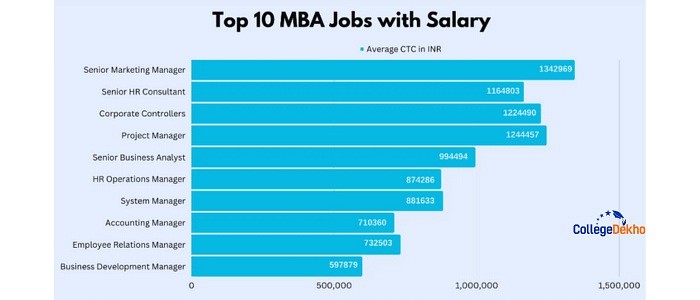MBA (Master of Business Administration) Course: Full Form, Degree, Subjects, Top Colleges
What is an MBA Course?
MBA stands for Master of Business Administration, which is a two-year postgraduate course aimed at shaping individuals into skilled leaders. It offers various study options like full-time, part-time, or online, each with its own range of specializations such as Finance, Marketing, Human Resources, or Entrepreneurship. The MBA syllabus equips individuals with the skills and knowledge needed to thrive in the world of business, offering a pathway to success and prosperity. For MBA admission, one needs a bachelor's degree with at least 50% marks and a decent score on MBA entrance exams like CAT, XAT or CMAT. However, some colleges may admit students based on their academic record alone.
In India, prestigious institutions like IIMs, IITs, IIFT, XLRI, MDI Gurgaon, JBIMS, and SIBM offer MBA course. The total fees generally range between INR 20,000 to INR 40 lakhs, with MBA courses from top IIMs costing around INR 20-30 lakhs. Upon graduation, students can expect to find MBA jobs like Finance Manager, HR Manager, Sales Manager, or Marketing Specialist, with MBA salary starting from around INR 5-8 lakhs per year for beginners and reaching up to INR 30-55 lakhs for experienced professionals. Students who want to understand what is an MBA degree and what it includes can keep reading to find the complete information below.
MBA Latest Update
AP ICET 2024 application form was released on March 6, 2024, on the official website at cets.apsche.ap.gov.in. Candidates can complete the registration by April 7, 2024. Sri Krishnadevaraya University will conduct the exam on May 6 & 7, 2024, on behalf of APSCHE.
CMAT 2024 registration will begin soon, most likely in the second week of March 2024. NTA will announce the exam date along with the release of the application form on the official website. The exam is expected to be conducted in April/ May 2024.
MAH MBA CET 2024 exam was conducted on March 9, 10 & 11, 2024, in 36 cities across Maharashtra and 12 cities in the rest of India. Candidates who appeared for the exam can check out the detailed MAH MBA CET 2024 exam analysis.
KMAT Kerala 2024 exam was conducted on March 3, 2024. Candidates who appeared for the exam can check the KMAT Kerala Exam Analysis 2024 to know the difficulty level, good attempts, and more.
The TS ICET application form 2024 was released on March 7, 2024, and be accessible till April 30, 2024, without a late fee. The exam will be conducted by Kakatoiya University on June 4 & 5, 2024, in computer-based mode.
Table of Contents
- What is an MBA Course?
- MBA Latest Update
- MBA Course Highlights
- What is MBA Full Form?
- Why Choose an MBA Degree?
- Who Should Do MBA?
- Types of MBA Courses
- What is an Online MBA Course?
- MBA Eligibility Criteria
- MBA Entrance Exams in India
- MBA Cutoff 2024
- MBA Admission Process in India
- How to Get Direct MBA Admission Without Entrance Exam?
- MBA Scholarships Offered by Top Colleges in India
- MBA Course Syllabus
- List of Popular MBA Specializations
- MBA Vs CA
- What is the Difference Between MBA and PGDM?
- MBA Course Fees in India
- Top Government MBA Colleges in India
- Top Private MBA Colleges in India
- Top Distance MBA Colleges in India
- Top MBA Colleges Offering Direct Admission in India
- Top MBA Colleges by Location
- Placements at Best MBA Colleges in India
- Career Options After MBA Course
- Study Full-time MBA Course Abroad
- Courses After MBA Degree
- Other Popular Courses
- FAQs about Masters of Business Administration
MBA Course Highlights
If you are interested in pursuing an MBA course, check out the major highlights mentioned below.
| Particulars | Details |
|---|---|
| Course Name | MBA or Master of Business Administration |
| Course Level | Postgraduate |
| Types of Courses | Full-Time, Part-Time, Distance, Online, Executive, Integrated |
| MBA Course Duration |
|
| Top Specializations | Sales, Marketing, Finance, Human Resources, IT, Operations, Business Analytics, etc. |
| MBA Eligibility Criteria | A bachelor's degree in any stream from a recognized university with a minimum of 50-% marks. |
| MBA Entrance Exams | CAT, MAT, XAT, ATMA, SNAP, CMAT, NMAT by GMAC, MAH MBA CET, etc. |
| Top B-Schools in India | IIMs, IITs, XLRI Jamshedpur, MDI Gurgaon, SIBM Pune, SPJIMR, NMIMS, JBIMS, FMS Delhi, etc. |
| MBA Fees in India | INR 20,000 to 40 Lakh |
| Top Job Profiles | HR Manager, Brand Manager, Product Manager, Marketing Manager, Sales Manager, Financial Analyst, Business Analyst, etc. |
| Average Salary in India |
|
| Top Recruiters | Amazon, Citigroup, Deloitte, Apple, Bain & Company, Flipkart, Microsoft, Google, Tesla, LinkedIn, PepsiCo, Unilever, Nike, Ernst & Young, and Deutsche Bank. |

What is MBA Full Form?
MBA full form is MBA is Master of Business Administration (also known as Master in Business Administration). MBA is a post-graduate degree that offers fundamental management knowledge and enhances an individual's skills and abilities to make them competent enough to work at managerial levels. This degree is widely recognized and respected in the business world, offering a gateway to numerous career opportunities across various industries and sectors. Admission to top MBA colleges is done based on MBA entrance exams and a bachelor's degree in Business Administration or any other stream.
Why Choose an MBA Degree?
MBA is an internationally acclaimed degree preferred by individuals who wish to get a holistic view of the business across areas like finance, marketing, human resources, operations, accounting, etc., all while developing vital skills necessary to lead. If you're wondering ‘Is MBA a useful degree?’ or ‘How does an MBA help your career?’ then read below to get all the answers for why you should do an MBA.
- Acquire Managerial Skills: MBA course helps develop business acumen and managerial skills and prepares a candidate to perform various managerial duties. It also instils communication, analytical, logical, comprehension, and various other crucial skills.
- Better Career Opportunities: With an MBA degree from a well-recognized institute, one can find high-paying jobs in some of the biggest organizations in India and abroad. Many working professionals choose MBA courses to boost their careers and grab better career opportunities.
- Develop Leadership Skills: By pursuing an MBA course, one can acquire leadership roles in top companies across the world. It prepares a candidate to lead a team, convey his ideas clearly to the team members, make decisions that can impact hundreds of people, and keep the functioning and operations of the business intact.
- Entrepreneurial Skill Development: An MBA helps students understand how a business works and what contributes to its success; thus, preparing them for entrepreneurial roles and starting their own company. So, if you have a burning idea for a business, an MBA course may help you get started.
- Lucrative Salary & Great Benefits: Students are offered exceptional salary packages between 20-50 lakhs per annum after graduating from an MBA course from a well-established college or university. Through IIM placements, one can even get a package of 70 lakhs per annum and above.
- Global Exposure to Business and Economy: Professionals working in the Management sector are exposed to businesses and economies of various nations. One can learn about global business administration and management techniques by taking up jobs after MBA.

Who Should Do MBA?
As mentioned above, the benefits of pursuing an MBA course are great; however, the decision should be made based on what a candidate is seeking out of it. If you are not sure about whether you should go for an MBA, check out the below points that discuss who should consider this course.
- Candidates Who Want to Evolve as Leaders: An MBA is ideal for aspiring leaders eager to develop their leadership skills in any field of interest. If you're ready to refine your managerial abilities and embrace leadership roles, then pursuing an MBA is your path forward.
- Graduates Looking for a Career in Management: Management is a highly sought-after profession worldwide. If you aspire to work in this field, pursuing an MBA is a worthwhile consideration. Regardless of your undergraduate course, an MBA can launch your career in Management.
- Individuals Aspiring to Become Entrepreneurs: An MBA equips aspiring entrepreneurs with the essential skills needed to navigate every facet of running a business, from managing finances and operations to empowering sales and marketing teams.
- Working Professionals Seeking Career Advancement: Full-time executives, with 3-5 years of experience, aiming to boost their networks, skills, and career prospects should do an EMBA. These programs provide an accelerated route to career growth and higher earnings.
- Business Owners Driven by Desire for Learning: Business owners can leverage an MBA for improved communication, team-building, and management strategies. Enhanced skills in strategic thinking and critical analysis enable them to elevate their business to new heights.
Types of MBA Courses
In the past, pursuing a full-time MBA degree was the most commonly chosen path for those looking to further their business education. However, in recent years, the landscape of MBA programs has changed significantly. Nowadays, there are a wide variety of MBA courses on offer, each designed to cater to different types of students. With so many options available, students can now choose a course that best suits their needs and goals. Check out the types of MBA courses.
| Type of Course | Details | Duration | Approx. Total Fees |
|---|---|---|---|
| Full-Time MBA | Demands full-time attendance for classes, involvement in extracurricular activities, participation in networking events, and completion of internships or training. | 2 Years | INR 2 Lakh to 30 Lakh |
| Part-time MBA | Designed for working professionals who wish to pursue further education while continuing to work. Classes are usually held during evenings, weekends, or online. | 2+ Years | INR 1 Lakh to 10 Lakh |
| One Year MBA | It is an accelerated program for candidates with significant work experience in business or related fields, offering a comprehensive education in business administration. | 1 Year | INR 10 Lakh to 40 Lakh |
| Executive MBA | Designed for professionals with 3 to 5 years or more of work experience, the curriculum emphasizes strategic leadership, executive decision-making, and advanced management concepts. | 1-2 Years | INR 10 Lakh to 45 Lakh |
| Online MBA | An online MBA is delivered entirely over the internet, providing flexibility for students to balance coursework with professional and personal commitments. | 2+ Years | INR 40,000 to 2 Lakh |
| Distance MBA | Distance learning enables students to study remotely from their own location, offering flexibility for those unable to attend on-campus classes due to work, family, or other commitments. | 2+ Years | INR 30,000 to 2.5 Lakh |
| BBA + MBA (Integrated MBA) | A dual degree program in business administration combines undergraduate and graduate studies, offering students time and cost savings compared to pursuing each degree separately. | 5 Years | INR 1 Lakh to 17 Lakh |
Also Read: Distance MBA vs Online MBA vs Regular MBA
What is an Online MBA Course?
Online MBA course is a great option for those who don't have time to attend classes due to various responsibilities. If you are a working professional who can't invest time in a full-time MBA program or just need to get a degree from the comfort of your home, then MBA online is a great option. The classes are conducted online and the recorded lectures are also available. The online MBA course subjects are designed to ensure one grasps the core values of the course and also develops the necessary skills.
Candidates can take admission to MBA online from any city to any desired college around the country by filling out the application form. IGNOU, Chandigarh University, LPU, and Symbiosis Centre for Distance Learning are some of the top institutes for online MBA. The annual course fees start from INR 40,000 to INR 2 lakhs, approximately. If you're wondering what is the qualification for MBA online, then it's the same as a regular MBA- you need to have a bachelor's degree with at least 50% marks.
Also Read: 10 Popular Online MBA Courses by Institute
MBA Eligibility Criteria
Candidates interested in MBA often have many questions like ‘What is the qualification for MBA?’ ‘Can I do MBA after 12th?’ or ‘Does MBA require Maths in 12th?’ Well, to be eligible for MBA admission in India, students need to meet certain requirements that may vary from college to college. Check out the MBA eligibility criteria for different types of courses:
| Course Type | Eligibility Criteria |
|---|---|
| Full-time MBA |
|
| Part-Time MBA |
|
| Distance MBA |
|
| Online MBA |
|
| Executive MBA |
|
Skills Required for MBA
- Analytical Skills: Ability to analyze complex data, identify trends, and make informed decisions.
- Leadership Skills: Capacity to lead teams, motivate others, and drive organizational change.
- Communication Skills: Strong verbal and written communication skills for effective interaction with stakeholders.
- Time Management: Skill to prioritize tasks, manage deadlines, and handle multiple responsibilities efficiently.
- Problem-Solving: Aptitude to identify problems, develop creative solutions, and implement effective strategies.
- Critical Thinking: Ability to evaluate information objectively, assess risks, and make sound judgments.
- Adaptability: Flexibility to adjust to changing situations, environments, and business dynamics.
- Teamwork: Collaboration skills to work effectively with diverse teams and achieve common goals.
- Financial Literacy: Understanding of financial concepts, including budgeting, forecasting, and financial analysis.
- Strategic Thinking: Capability to think long-term, develop strategic plans, and align organizational goals with market trends.
MBA Entrance Exams in India
Mentioned below are some of the top national, state, and university-level MBA entrance exams required to make a cut into the MBA colleges.
Top National-Level MBA Entrance Exams in India
| Exam Short Name | Exam Full Name | Conducting Body | Frequency |
|---|---|---|---|
| CAT | Common Admission Test | Indian Institutes of Management (IIMs) | Once a year |
| ATMA | AIMS Test for Management Admissions | Association of Indian Management Schools (AIMS) | 4-5 times a year |
| MAT | Management Aptitude Test | All India Management Association (AIMA) | Multiple times a year |
| CMAT | Common Management Admission Test | National Testing Agency (NTA) | Once a year |
| XAT | Xavier Aptitude Test | XLRI, Jamshedpur | Once a year |
| NMAT by GMAC | NMIMS Management Aptitude Test | Graduate Management Admission Council (GMAC) | Once a year (74-day test window) |
| SNAP | Symbiosis National Aptitude Test | Symbiosis International (Deemed) University (SIU) | Once a year |
| IBSAT | ICFAI Business School Aptitude Test | IFHE, Hyderabad | Once a year |
Top State-Level MBA Entrance Exams in India
| Exam Short Name | Exam Full Name | Conducting Body | Frequency |
|---|---|---|---|
| MAH MBA CET | Maharashtra Common Entrance Test | State Common Entrance Test Cell, Maharashtra | Once a year |
| TS ICET | Telangana State Integrated Common Entrance Test | Kakatiya University, Warangal | Once a year |
| AP ICET | Andhra Pradesh Integrated Common Entrance Test | Sri Venkateshwara University, Tirupati | Once a year |
| TANCET | Tamil Nadu Common Entrance Test | Anna University, Chennai | Once a year |
| KMAT | Karnataka Management Aptitude Test | Karnataka Post Graduate Private Colleges' Association (KPPGCA) | Once a year |
| KMAT Kerala | Kerala Management Aptitude Test | Commissioner for Entrance Exams (CEE) | Twice a year |
| OJEE | Odisha Joint Entrance Examination | OJEE Board (OJEEB) | Once a year |
Top University-Level MBA Entrance Exams in India
| Exam Short Name | Exam Full Name | Conducting Body | Frequency |
|---|---|---|---|
| MICAT | Mudra Institute of Communications Admission Test | MICA, Ahmedabad | Twice a year |
| CUET PG | Central University Entrance Test (Postgraduate) | National Testing Agency | Once a year |
| SRMJEEM | SRM Joint Entrance Exam for Management | SRM University | Multiple times a year |
| KIITEE Management | Kalinga Institute of Industrial Technology Entrance Exam for Management | KIIT School of Management | Once a year |
| UPESMET | UPES Management Entrance Test | University of Petroleum and Energy Studies, Dehradun | Multiple times a year |
MBA Entrance Exam Preparation Tips
Preparing for MBA entrance exams requires a strategic approach to ensure success. Here are some tips to help you prepare effectively:
- Understand the Exam Format: Familiarize yourself with the exam pattern, types of questions, and marking scheme.
- Create a Study Plan: Develop a comprehensive study plan that covers all the important topics. Allocate sufficient time for each subject based on your strengths and weaknesses.
- Focus on Fundamentals: Build a strong foundation in quantitative aptitude, verbal ability, logical reasoning, and data interpretation.
- Practice Regularly: Solve practice questions, sample papers, and mock tests regularly to improve your speed, accuracy, and problem-solving skills.
- Learn Time Management: Practice solving questions under timed conditions to improve your speed and accuracy. Learn to prioritize questions and manage time efficiently in each section.
- Stay Updated: Read newspapers, magazines, and online resources regularly to stay informed about the latest developments.
- Seek Guidance: Consider joining coaching classes or online courses specifically designed for MBA entrance exam preparation.
- Review and Analyze: After taking mock tests or practice exams, review your performance thoroughly. Identify your strengths and weaknesses, analyze your mistakes, and work on improving them.
- Stay Healthy and Manage Stress: Take regular breaks, practice relaxation techniques, and stay positive and focused throughout your preparation journey.
- Believe in Yourself: Lastly, believe in yourself and stay confident. With dedication, perseverance, and the right preparation strategy, you can crack any MBA entrance exam.
Best Book for MBA Entrance Exam Preparation
If you are planning to appear for popular MBA entrance exams, it's important to have the right study material to help you prepare. To give you a head start, we have compiled a list of highly recommended books that cover a wide range of topics from quantitative aptitude to verbal ability.
| Name of the Book | Author(s) |
|---|---|
| How to Prepare for Verbal Ability and Reading Comprehension for CAT | Arun Sharma and Meenakshi Upadhyay |
| How to Prepare for Data Interpretation for CAT | Arun Sharma |
| How to Prepare for Quantitative Aptitude for CAT | Arun Sharma |
| Quantitative Aptitude for Competitive Examinations | R.S. Aggarwal |
| A Modern Approach to Verbal & Non-Verbal Reasoning | R.S. Aggarwal |
| The Pearson Guide to Logical Reasoning and Data Interpretation for the CAT | Nishit K. Sinha |
| Word Power Made Easy | Norman Lewis |

MBA Cutoff 2024
For admission to MBA colleges that accept entrance exams, candidates need to clear the minimum cutoff. The MBA cutoff is typically released separately by every college and students must meet it to be eligible for counselling rounds. Check out the MBA cutoff for top B-schools in India.
CAT 2023 Cutoff for Top IIMs in India
| Name of the IIM | General Cutoff | ST Cutoff | SC Cutoff | EWS Cutoff | OBC Cutoff |
|---|---|---|---|---|---|
| IIM Ahmedabad | 80 | 60 | 70 | 80 | 75 |
| IIM Lucknow | 90 | 60 | 65 | 82 | 82 |
| IIM Kozhikode | 85 | 55 | 65 | 75 | 75 |
| IIM Bangalore | 85 | 65 | 70 | 75 | 75 |
| IIM Indore | 90 | 50 | 60 | 90 | 80 |
| IIM Calcutta | 85 | 65 | 70 | 75 | 75 |
| IIM Rohtak | 95 | 30 | 55 | 90 | 78 |
| IIM Mumbai | 85 | 65 | 70 | 75 | 75 |
| IIM Udaipur | 92 | 40 | 54 | 70 | 74 |
| IIM Amritsar | 85 | 40 | 55 | 85 | 75 |
CAT 2023 Cutoff for Top Non-IIMs in India
| Name of Institute | Expected CAT 2023 Cut Off |
|---|---|
| IIT Bombay | 99+ |
| Faculty of Management Studies, New Delhi | 98-99 |
| MDI, Gurgaon | 97-99 |
| SP Jain Institute of Management and Research, Mumbai | 95-99 |
| IIT Delhi | 98+ |
| Institute of Management Technology, Ghaziabad | 95-97 |
| Xavier Institute of Management, Bhubaneshwar | 91 |
| IMI, New Delhi | 90 |
| K J Somaiya, Mumbai | 86 |
| GIM Goa | 85 |
MBA Admission Process in India
The basic admission process for MBA courses consists of certain phases that are similar across a majority of management institutes. Here are the stages that every MBA candidate must go through to seek admission into an MBA.
- Apply for Entrance Exams: The first step is to apply for the MBA entrance exams accepted by the colleges one is seeking admission to. Check all the requirements of the entrance exam and ensure you meet them.
- Qualify for Entrance Exams: If you qualify for the entrance exam and meet the minimum cutoff, you will be called for selection rounds. Students need to register to take part in the counselling and fulfil all the requirements.
- Participate in Counselling: Based on the entrance exam scores, candidates are shortlisted and called for Group Discussions, Written Ability Test, or Personal Interview rounds. MBA colleges offering direct admissions to MBA, on a merit basis also conduct personal interview rounds.
- Appear in the Merit List: After evaluating candidates based on entrance exam scores, GD/PI performance, academic performance, and work experience (if any), the final list of selected students will be declared.
- Report to the College: Those who have been allocated a seat in the MBA college will be required to do the reporting (offline or online) and pay the admission fees. The classes will commence after that.

Also Read:
How to Get Direct MBA Admission Without Entrance Exam?
Many MBA colleges in India provide an opportunity for direct MBA admission without entrance exams, solely based on academic performance. The admission process for such programs is straightforward and doesn't involve multiple stages such as entrance exams, counselling sessions, and seat allotment rounds. To apply for direct admission to MBA programs, candidates must fulfil the eligibility criteria specified by the college they are interested in.
Generally, candidates must have completed their graduation from a recognized board with a minimum of 50% aggregate marks. However, the requirement for aggregate marks may vary from college to college. Some colleges may also conduct personal interviews to assess the candidates' communication skills, analytical ability, and other relevant skills. Candidates must thoroughly check the requirements of the college they are interested in before applying for admission since the direct MBA admission process and eligibility criteria may vary from college to college.
MBA Scholarships Offered by Top Colleges in India
Pursuing an MBA degree can be a costly affair, and securing a scholarship can be a great way to ease the financial burden. If you're planning to pursue an MBA course in India, you'll be happy to know that there are several colleges that offer scholarships to deserving candidates. The top MBA colleges in India that offer scholarships have been mentioned below.
| College Name | Scholarships Awarded |
|---|---|
| IIM Ahmedabad |
|
| IIM Calcutta | Scholarships sponsored by various companies/corporates like Aditya Birla Group, Ratan Tata Trust, T. Thomas Scholarship sponsored by HUL, OP Jindal Engineering & Management Scholarship |
| IIM Bangalore |
|
| IIM Kozhikode |
|
| IIM Indore | Need-Based Financial Assistance |
| IIM Lucknow | Need-Based IIML Scholarships |
| XLRI Jamshedpur |
|
MBA Course Syllabus
The MBA syllabus is designed to equip students with a detailed and in-depth knowledge of the multifaceted management sector. It is carefully curated to provide a comprehensive understanding of the role of management in the business world and how it impacts the success of organizations. Through the course, students are introduced to various theories and practical approaches to management, and they learn to apply them in real-life scenarios.
Check the semester-wise MBA syllabus provided in the table below.
| Semester 1 | Semester 2 | Semester 3 | Semester 4 |
|---|---|---|---|
|
|
|
|
List of Popular MBA Specializations
There are more than 50 specializations in MBA that cater to various industries and fields. Based on their interest, candidates can choose a career path best suited for them. Check out the table below to know about the most popular MBA specializations available in India.

MBA Vs CA
After completing a bachelor’s degree, many students get confused between an MBA and CA. There is a huge difference between both courses as an MBA focuses on marketing, finance, operations, sales, and many other business areas while a CA course mainly focuses on accounting and taxation. To help candidates decide whether to choose an MBA or a CA course, we have provided a quick comparison below.
| Point of Difference | MBA | CA |
|---|---|---|
| Duration and Structure | Typically a 2-year program, although some executive or part-time MBAs may take longer. It involves coursework, projects, internships, and sometimes a thesis. | Requires passing a series of exams conducted by the Institute of Chartered Accountants of India (ICAI). It involves theoretical study and practical training (articleship), usually taking 3-5 years to complete. |
| Focus and Specialization | Offers a broad education in various aspects of business management such as finance, marketing, operations, and human resources. | Focuses specifically on accounting, taxation, auditing, and financial management. It provides in-depth knowledge and expertise in financial matters. |
| Skills Developed | Emphasizes leadership, strategic thinking, problem-solving, communication, and networking skills. | Develops strong analytical, accounting, auditing, and financial management skills. |
| Career Path | Opens up diverse career opportunities in various sectors like finance, marketing, operations, HR, business analytics, etc. Candidates can work as managers in their specialized areas or start their businesses. | Primarily leads to careers in accounting, auditing, taxation, and finance. CAs are often employed in accounting firms, corporations, and government agencies, or can work independently as consultants. |
| Salary and Earning Potential | While freshers can earn around INR 5 LPA to 8 LPA, experienced professionals can earn between INR 10 LPA to 18 LPA. Senior-level executives can make around INR 30 LPA to INR 55 LPA. | The average salary of a CA is around INR 6 LPA to INR 9 LPA for freshers and can go up to INR 20 LPA to INR 25 LPA for experienced professionals. |
What is the Difference Between MBA and PGDM?
‘Is PGDM better than MBA?’ ‘MBA or PGDM which has more value?’ ‘Which is better MBA or PGDM for government jobs?’ Well, these are some of the common queries of candidates seeking postgraduate management education as both MBA and PGDM are popular choices. To answer such questions, we have provided below some key difference between MBA and PGDM to help students pick the right course.
| Point of Difference | MBA | PGDM |
|---|---|---|
| Qualification | Master's degree conferred by universities or affiliated colleges. | Postgraduate diploma awarded by autonomous institutes or business schools. |
| Affiliation and Recognition | Offered by universities and are subject to the regulations and approval of the respective university and higher education authorities. | Offered by autonomous institutes and approved by bodies like AICTE, but the curriculum and evaluation methods are set by the institute itself. |
| Curriculum Flexibility | Limited flexibility in terms of course offerings. | More flexibility in designing their curriculum. |
| Emphasis on Practical Skills | Theoretical approach, with a mix of practical exposure, depending on the university and the specific program. | Emphasize practical training and real-world exposure through internships, industry projects, and workshops. |
| Duration | 2 Years | 1-2 Years |
| Admission Criteria | Entrance Exam + Merit | Entrance Exam + Merit |
| Global Recognition | MBA degrees from reputed universities are often recognized and respected worldwide. | Varying degrees of global recognition, depending on the reputation of the institute offering the program. |
Also Read: Distance Learning MBA Vs Part Time MBA
MBA Course Fees in India
Before applying to their desired colleges, candidates must check out MBA fees in India so that they do not face any financial issues down the road. Here's the MBA fee of top colleges in India:
| Name of the College | Total Fees (Approx.) |
|---|---|
| IIM Ahmedabad Fee | INR 33,00,000 |
| IIM Bangalore Fee | INR 24,50,000 |
| IIM Calcutta Fee | INR 31,00,000 |
| IIM Lucknow Fee | INR 19,25,000 |
| IIM Udaipur Fee | INR 20,43,000 |
| IIM Ranchi Fee | INR 17,20,000 |
| IIT Kharagpur Fee | INR 11,59,760 |
| IIT Delhi Fee | INR 11,20,000 |
| FMS Delhi Fee | INR 20,960 |
| IIM Mumbai Fee | INR 21,00,000 |
| IIFT New Delhi Fee | INR 21,77,314 |
| SIBM Pune Fee | INR 26,79,500 |
| MDI Gurgaon Fee | INR 24,99,400 |
| NMIMS Mumbai Fee | INR 21,90,000 |
| XLRI Jamshedpur Fee | INR 23,50,000 |
| SP Jain Mumbai Fee | INR 24,00,000 |
| IIT Roorkee Fee | INR 9,67,600 |
| IIT Bombay Fee | INR 1,03,200 |
| IIT Madras Fee | INR 8,07,002 |
| GLIM Chennai Fee | INR 20,80,000 |
Top Government MBA Colleges in India
India has some of the best government MBA colleges that are known globally such as IIMs, IITs, etc. Getting into IIMs is only possible if a candidate qualifies for CAT, and the competition is quite tough. Have a look at the top government MBA colleges in India with their NIRF Ranking 2023 and MBA course fees.
| Name of the College | NIRF Ranking 2023 | Total Fees |
|---|---|---|
| IIM Ahmedabad | 1 | INR 33,00,000 |
| IIM Bangalore | 2 | INR 24,50,000 |
| IIM Kozhikode | 3 | INR 22,50,000 |
| IIM Calcutta | 4 | INR 31,00,000 |
| IIT Delhi | 5 | INR 11,20,000 |
| IIM Lucknow | 6 | INR 19,25,000 |
| IIM Mumbai | 7 | INR 21,00,000 |
| IIM Indore | 8 | INR 21,17,158 |
| IIT Bombay | 10 | INR 1,03,200 |
| IIM Raipur | 11 | INR 18,00,000 |
| IIM Rohtak | 12 | INR 18,36,500 |
| IIT Kharagpur | 14 | INR 11,59,760 |
| IIT Madras | 15 | INR 8,07,002 |
Top Private MBA Colleges in India
There are various private B-schools in India offering the best management education. MBA aspirants can have a look at the list of top private MBA colleges in India with their NIRF Ranking 2023 and average MBA course fees.
| Name of the College | NIRF Ranking 2023 | Total Fees |
|---|---|---|
| XLRI Jamshedpur | 9 | INR 23,50,000 |
| MDI Gurugram | 13 | INR 24,99,400 |
| SIBM Pune | 17 | INR 26,79,500 |
| SPJIMR Mumbai | 20 | INR 24,00,000 |
| NMIMS, Mumbai | 21 | INR 21,90,000 |
| Amity University | 28 | INR 13,44,000 |
| GILM Chennai | 31 | INR 20,80,000 |
| Lovely Professional University | 32 | INR 8,00,000 |
| IMI New Delhi | 34 | INR 20,95,230 |
| TAPMI Manipal | 42 | INR 18,74,000 |
| XIM University Bhubaneswar | 46 | INR 21,40,000 |
| KIIT Bhubaneswar | 59 | INR 16,90,000 |
| Chandigarh Group Of Colleges, Landran | - | INR 124,200 |
Top Distance MBA Colleges in India
The table below includes the college list of the best distance learning MBA in India along with the courses offered and the fee structure
| Distance MBA Colleges in India | Courses Offered | Approx. Fees (Per Annum) |
|---|---|---|
| University of Petroleum and Energy Studies (UPES), Dehradun | MBA | INR 72,500 |
| Chandigarh University | MBA | INR 27,650 |
| Indira Gandhi National Open University (IGNOU) | MBA | INR 31,500 |
| Lovely Professional University | PGDM / MBA | INR50,000 |
| Symbiosis Centre for Distance Learning | PGDM (2-year course) | INR 37,000 |
| Narsee Monjee Institute of Management Studies, Mumbai | PGDBM (2-year course) | INR 43,000 |
| IMT Ghaziabad | PGDM (2-year course) | INR 88.000 |
| SRM University, Chennai | MBA | INR 30,000 |
| Maharshi Dayanand University, Rohtak | MBA | INR 30,000 |
| Annamalai University, Tamil Nadu | MBA | INR 30,000 – INR 35,000 |
| Amity University | MBA / PGDM | INR 70,000 – INR 1,00,000 |
| Bharathidasan University – Centre for Distance Learning | MBA | INR 30,000 |
| GITAM – Centre for Distance Learning, Visakhapatnam (Institute of Eminence) | MBA | INR 30,000 |
| Jain University, Bangalore | 1-year PGDM | INR 16,800 |
| Andhra University (CDL) | MBA | INR 25,000 to INR 30,000 |
| Acharya Nagarjuna University, Andhra Pradesh | MBA | INR 25,000 to INR 30,000 |
| Jagannath University, Jaipur | MBA | INR 25,000 |
Top MBA Colleges Offering Direct Admission in India
Check out the top B-Schools in India offering direct admission to MBA without entrance exams.
| Name of the College | Total Fees (Approx.) |
|---|---|
| R V Institute of Management, Bangalore | INR 2,78,000 |
| Indus Business Academy, Bangalore | INR 14,05,000 |
| Alliance School of Business, Bangalore | INR 15,00,000 |
| Christ Deemed University, Bangalore | INR 9,30,000 |
| Apeejay School of Management, Delhi | INR 8,70,000 |
| Millennium School of Business, Delhi | INR 3,00,000 |
| Asian Business School, Delhi | INR 8,25,000 |
| Amity University, Noida | INR 13,44,000 |
| Lovely Professional University, Jalandhar | INR 8,00,000 |
| Universal Group of Institutions, Mohali | INR 1,60,000 |
| School of Management Studies, Patiala | INR 1,79,860 |
| Narayana Business School, Ahmedabad | INR 5,85,000 |
| Auro University, Surat | INR 7,15,000 |
| Indian School of Business Management & Administration, Ahmedabad | INR 49,900 |
| Ballari Institute of Technology and Management, Bellary | INR 1,50,000 |
| Annapoorna Institute of Management and Research, Hukkeri | INR 1,80,000 |
Top MBA Colleges by Location
MBA courses in India are offered by more than 5,000 MBA colleges. Check out the list of top MBA colleges by state and city provided below.
State-Wise MBA Colleges in India
City-Wise MBA Colleges in India
Placements at Best MBA Colleges in India
Many B-schools in India, especially IIMs and IITs, offer excellent placement opportunities to MBA students. Check the list of MBA colleges with best placements in India 2023.
| College Name | Average Placement Package 2023 | Average Placement Package 2022 | Average Placement Package 2021 |
|---|---|---|---|
| IIM Ahmedabad | INR 36.2 LPA | INR 32.80 LPA | INR 27.54 LPA |
| IIM Bangalore | INR 35.31 LPA | INR 33.82 LPA | INR 28.98 LPA |
| IIM Calcutta | INR 35.07 LPA | INR 34.20 LPA | INR 29.00 LPA |
| FMS Delhi | INR 34.10 LPA | INR 32.40 LPA | INR 26.20 LPA |
| IIM Lucknow | INR 32.20 LPA | INR 31.03 LPA | INR 26.00 LPA |
| ISB Hyderabad | INR 34.21 LPA | INR 34.08 LPA | INR 28.21 LPA |
| Masters Union, Gurugram | INR 33.10 LPA | INR 29.12 LPA | INR 27.45 LPA |
| SPJIMR, Mumbai | INR 33.02 LPA | INR 32.05 LPA | INR 26.06 LPA |
| XLRI Jamshedpur | INR 32.70 LPA | INR 30.07 LPA | INR 25.08 LPA |
| IIM Kozhikode | INR 31.02 LPA | INR 29.50 LPA | INR 22.53 LPA |
| IIM Indore | INR 30.21 LPA | INR 25.01 LPA | INR 23.60 LPA |
| IIFT Delhi | INR 29.10 LPA | INR 25.16 LPA | INR 21.08 LPA |
| SJMSoM, IIT Bombay | INR 28.88 LPA | INR 25.93 LPA | INR 21.96 LPA |
| MDI Gurgaon | INR 27.67 LPA | INR 26.65 LPA | INR 23.15 LPA |
| TISS Mumbai | INR 27.22 LPA | INR 23.97 LPA | INR 19.62 LPA |
Source: Placement reports 2023 based on data released by colleges listed above.
Career Options After MBA Course
MBA is a highly skilled degree and opens up various opportunities for candidates. Mentioned below are the top jobs after MBA available in different sectors.
| Employment Areas | Job Profiles |
|---|---|
| Banks | Account Manager, Administrative Officer, Human Resource Manager, Marketing Manager, Card Payments Operations Head, Vice President - Investment Banking |
| Brand & Marketing | Brand Manager, IT Services Marketing Head, Marketing Manager |
| Business Consultancies | Human Resource Manager, Management Consultant |
| Educational Institutes | Trainer, Administrative Officer |
| Financial Organizations | Recruitment Manager, Administrative Officer, Equity Research Analyst, Human Resource Manager |
| Industrial Houses | HR Generalist Business Partner, Zonal Business Manager, Project Manager, Administrative Officer, Finance Manager, Marketing Manager |
| Multinational Companies | Lobbyist/Organizer, Recruitment Manager |
| Personal Business | Entrepreneur |
| Public Works | Research and Development Manager, Labour Management Relations Specialist |
| Tourism Industry | Human Resource Managers, Administrative Officer |
Average MBA Salary in India
A fresh graduate can expect an average salary of INR 5-8 lakh per year, while a professional with 4-5 years of experience can earn between INR 10-18 lakh per year. Senior or executive-level professionals can earn between INR 30-55 lakh per year. The average salary package offered by top IIMs ranges from INR 20-25 lakh per annum, while the highest salary ranges from INR 70 lakh to INR 1 crore. Check the average MBA salary for different jobs provided below.

Average Salary in MBA in Marketing Management
| Job Profile | Average Salary (Per Annum) |
|---|---|
| Senior Marketing Manager | INR 1,342,969 |
| Marketing Manager | INR 685,280 |
| Senior Business Analyst | INR 994,494 |
| Business Development Manager | INR 597,879 |
| Business Development Executive | INR 299,907 |
| Area Sales Manager | INR 609,533 |
| Project Manager | INR 1,263,774 |
Average Salary in MBA in Human Resources
| Job Position | Average Salary (Per Annum) |
|---|---|
| Human Resources Manager | INR 7,05,853 |
| Senior Human Resources Consultant | INR 11,64,803 |
| HR Operations Manager | INR 8,74,286 |
| Employee Relations Manager | INR 7,32,503 |
Average Salary in MBA in Finance
| Job Position | Average Salary (Per Annum) |
|---|---|
| Accounting Manager | INR 7,10,360 |
| Credit Managers | INR 5,80,576 |
| Financial Analyst | INR 4,12,339 |
| Corporate Controllers | INR 12,24,490 |
Average Salary in MBA in Logistics and Supply Chain Management
| Job Position | Average Salary (Per Annum) |
|---|---|
| Logistics Officer | INR 4,36,344 |
| Logistics Supervisor | INR 2,56,529 |
| Logistic Manager | INR 6,06,122 |
| Supply Chain Coordinator | INR 3,97,561 |
Average Salary in MBA in Information Technology
| Job Position | Average Salary (Per Annum) |
|---|---|
| Project Manager | INR 12,44,457 |
| Business Development Manager | INR 5,98,910 |
| Marketing Manager | INR 6,90,763 |
| System Manager | INR 8,81,633 |
Top Recruiters Hiring MBA Graduates
Almost every company requires skilled managers to manage all their activities. Some of the major recruiters hiring graduates with MBA degree are provided below.
Top Private MBA Recruiters
| Avendus | Samsung | TAS |
|---|---|---|
| Deloitte | ITC | Tata |
| HDFC | Larsen & Toubro | Microland |
| ICICI Bank | EXL | Accenture |
| JP Morgan Chase & Co. | HSBC | Amazon |
| Mahindra | Goldman Sachs | Wipro |
| McKinsey & Company | Nestle | Aditya Birla Group |
| Reliance | Vodafone | Microsoft |
Top Government MBA Recruiters
| Air India Express | BEML Limited | ITI Limited |
|---|---|---|
| RBI | Bharat Electronics Limited | IBPS |
| Engineering Projects India Limited | IIT Kharagpur | City Union Bank |
| Coal India Limited | SBI | Central Bank of India |
| NABARD Consultancy Services | National Housing Bank | Bank of Baroda |
MBA Scope in India
For an MBA graduate in India, the career prospects are immense. The opportunities to land lucrative and fulfilling jobs are abundant right after graduation. With a minimum of 5-10 years of experience, an MBA candidate in India can expect to earn an impressive salary of INR 14,00,000 LPA without any doubt. With more than 15 years of experience, the possibilities only get better as senior-level positions in Management such as Director, Vice President, and Senior Director become easily attainable. These positions offer outstanding remuneration packages of up to INR 25 LPA or more, with no upper limit.
An MBA degree offers a wide range of career opportunities in both private and government sectors, ranging from Marketing to Tourism and Healthcare. Graduates with exceptional knowledge and skills can secure junior, senior, and executive-level private and government jobs after MBA. The jobs in this field can be highly rewarding and satisfying, particularly for alumni from the top B-schools. However, even without college placements, candidates with the right skill set and expertise can easily land jobs in the top companies and organizations.
Depending on the specialization, skillset, and knowledge, candidates can opt for highly lucrative job options after completing their MBA, which not only provide high salary packages but also other fantastic benefits. The possibilities are endless for MBA graduates in India, and it is truly an exciting time to enter the job market with this degree.
Study Full-time MBA Course Abroad
Students often get confused between MBA in India vs MBA abroad for so many reasons. Based on the country, candidates also have to either appear for the International English Language Testing System (IELTS), or the Test of English as a Foreign Language (TOEFL). The fee for doing an MBA abroad is generally higher than in India, however, students can earn an MBA scholarship to afford education in foreign countries.
Eligibility Criteria to Study MBA Abroad
- Completed graduation in Management or a related stream from a recognized college or university.
- Clear the GMAT (Graduate Management Aptitude Test).
- Proficient in the local language of the country.
- 3-5 years of work experience and a Letter of Recommendation may be required.
Top MBA Colleges Abroad
Here are a few top MBA colleges abroad you may consider for admission:
| Name of the College | Country Located in |
|---|---|
| Harvard Business School | USA |
| University of Oxford | UK |
| Standford Graduate School of Business | USA |
| Penn (Wharton) | USA |
| HEC (Paris) | Canada |
| MIT Sloan | USA |
| London Business School | UK |
| IE Business School | Spain |
| Columbia Business School | UK |
| IESE Business School | Spain |
| University of East London | UK |
| University Canada West | Canada |
| University of Waikato | New Zealand |
| University of Alberta | Canada |
| University of Toronto | Canada |
| Dublin Business School | Ireland |
Courses After MBA Degree
After an MBA, candidates have the option of continuing their study in the field of management or they can also expand their knowledge and expertise by opting for courses from different fields and areas. Some of the best courses to pursue after an MBA are mentioned in the table below:
| Courses after MBA | Average Cost | Average Salary |
|---|---|---|
| Cost and Management Accounting (CMA) | INR 1,00,000 - INR 4,00,000 | INR 5,00,000 - 20,00,000 |
| Fellowship Programme in Management | INR 6,00,000 - INR 13,00,000 | INR 10,00,000 - INR 40,00,000 |
| PhD in Management | INR 10,000 - INR 3,00,000 | INR 5,00,000 - INR 10,00,000 |
| Chartered Financial Analyst (CFA) | INR 40,000 - INR 2,00,000 | INR 6,00,000 - INR 12,00,000 |
| Executive MBA | INR 4,00,000 - INR 15,00,000 | INR 20,00,000 - INR 25,00,000 |
| Financial Risk Management (FRM) | INR 1,00,000 | INR 2,00,000 - INR 10,00,000 |
Other Popular Courses
FAQs about Masters of Business Administration
What are the benefits of doing MBA in India?
The benefits of doing an MBA in India is that you can get jobs in leading organizations through campus placement with an average salary of INR 10 to 30 lakh per annum. Pursuing MBA from IIMs can get you a job in any leading organization around the world.
Is MBA a three-year course?
No, typically an MBA is not a three-year course. Traditional full-time MBA programs typically last for about two years, but part-time MBA programs may range from two to five years or more. There are also accelerated MBA programs that allow students to complete their degree in less than two years.
Does MBA have Maths?
Yes, all MBA courses require some degree of knowledge in Mathematics. However, it is not compulsory to be great at the subject. An MBA aspirant needs analytical knowledge of basic concepts like arithmetic, algebra, geometry, etc.
Which is better: MBA from the IITs or the newer IIMs?
MBA from top IIMs is considered better than IITs. Although IITs are the elite engineering institutes in India, their brand value in the field of management is catching up fast. As per NIRF Ranking 2023, IIT Bombay, IIT Delhi, IIT Madras, and IIT Kharagpur are ranked better than many new IIMs. Also, pursuing an MBA from IITs is way cheaper than IIMs.
What are the different job profiles offered at top MBA colleges like IIMs, ISB, XLRI, and FMS?
The different job profiles offered at top MBA colleges like IIMs, ISB, XLRI, and FMS include Marketing Manager, Management Consultant, Investment Banker, Business Analyst, Financial Advisor, Administrative Manager, Human Resource Manager, Product Manager, Operations Manager, Sales Manager, Business Analyst, etc.
How can an MBA course improve my career prospects?
An MBA can improve a candidate's career prospects in many ways. With an MBA degree, one gets practical business knowledge and acquires entrepreneurial and communication skills. An MBA can bring a significant increment in your salary and open the way for lucrative career opportunities in top corporations.
What is the best MBA course?
Determining the best MBA course can vary greatly depending on individual preferences, career goals, and personal circumstances. In India, IIMs are considered to be providing the best MBA courses. They have excellent pedagogy, top-notch facilities, impressive placements, and more.
How to decide which MBA course is most suitable for me?
To decide which MBA course is most suitable for you, consider your career requirements and how intensive and detailed you want your degree to be during the upcoming 18 to 24 months. If you want to have classroom experience and gain practical training and industry exposure, choose a full-time MBA. You can select distance learning options, online MBA programs, or a part-time course if you have time constraints. Executive MBA programs are great for working professionals to advance their careers and increase their earning potential.
MBA in India or Abroad: Which is more beneficial?
Deciding whether to pursue an MBA in India or abroad depends on various factors including your career goals, financial situation, personal preferences, and the quality of education. Pursuing an MBA from IIMs and other top colleges will open a plethora of working opportunities in top corporations with impressive salary packages and other benefits. With a management degree from a top foreign university, one can work with international organizations and be exposed to diverse business practices and management techniques.
Which is better, a full-time MBA or an online MBA program?
A full-time MBA and an online MBA both are good options. If a candidate can invest time in attending regular classes, then a full-time MBA is a better option. However, if you are a working professional or have other responsibilities, then an online MBA is a good option.
Does one need prior work experience to apply for MBA?
It is not mandatory to have prior work experience to pursue an MBA course. However, candidates with exposure to a work environment can add practical exposure to real-world business situations with their insights. However, to apply for Executive MBA programs, individuals need to have 5 or more years of experience.
Should only individuals interested in leadership roles pursue an MBA course?
An MBA is a versatile and extensive degree with diverse specializations and multiple applications in various professional domains. MBA graduates with good educational backgrounds, excellent communication skills, and creative vision are valuable resources who can get great career opportunities to work in different domains and sectors.
What is the difference between MBA and PGDM degree?
The difference between MBA and PGDM is that MBA is a degree program while PGDM is a diploma program. A PGDM program is offered by AICTE-recognized and standalone/autonomous B-Schools, under the Ministry of HRD while universities that come under the University Grants Commission (UGC) can award an MBA degree.
What are the best MBA colleges offering direct admission without entrance exams?
The best MBA colleges offering direct admission without entrance exams include Indira Gandhi National Open University, JECRC University, Jagannath University, Acharya Institute of Management and Science, Apeejay School of Management, Amity University, Lovely Professional University, NMIMS Distance Education, Chandigarh Distance Learning, SVU Distance Education, and Symbiosis Distance Learning.
What is MBA course fees in India?
The total MBA course fees in India generally range between INR 20,000 to INR 40 lakhs. MBA courses from top IIMs generally cost around INR 20-30 lakhs. The MBA fees in private colleges is generally higher as compared to government colleges in India.
Which are the top distance MBA colleges in India?
The top distance MBA colleges in India include Amity University, NMIMS University, WeSchool or Welingkar Institute of Management Development, Symbiosis Centre for Distance Learning, Xavier School Of Management, LPU Distance Education, UPES Dehradun, Bharathi Vidyapeeth Deemed University, GITAM – Centre for Distance Learning, Visakhapatnam (Institute of Eminence), etc.
Which MBA colleges in India offer the best ROI (Return on Investments)?
The MBA colleges in India that offer the best ROI (Return on Investments) are FMS Delhi, IIM Ahmedabad, IIM Bangalore, IIM Calcutta, IIFT Delhi, DMS-IIT Delhi, SJMSOM-IIT Bombay, IIM Rohtak, IIM Ranchi, MDI Gurgaon, IIM Indore, XLRI Jamshedpur, IIM Kozhikode, etc.
What are the most popular MBA entrance exams in India?
Some of the top MBA entrance exams in India are CAT (Common Admission Test), XAT (Xavier Aptitude Test), SNAP (Symbiosis National Aptitude Test), MAH-CET (Maharashtra Common Entrance Test), CMAT (Common Management Admission Test), NMAT (Narsee Monjee Management Aptitude Test), MAT (Management Aptitude Test), and ATMA (AIMS Test for Management Admissions).
What after the MBA course?
After the MBA course, graduates can apply for jobs as per their specializations. The popular MBA job profiles include Marketing Manager, Finance Manager, Sales Manager, Product Manager, Operations Manager, HR Manager, etc. Individuals can also become entrepreneurs or grow their business after completing an MBA.
What is the duration of MBA course?
Usually, the duration of an MBA course is 2 years. However, with different types of MBA, the course duration differs. For Executive MBA, the duration is 15-19 months, for online/ distance MBA, the duration is 2-3 years, and for integrated MBA, the duration is a minimum of 5 years.
Is MBA a good career option?
Yes, MBA is a good career option. Anyone who has the skills and interest in building a career in the managerial background or wants to enter the business world can opt for MBA as a career option.
Can you do MBA course after 12th?
Yes, an Integrated MBA course is available for candidates after Class 12. Many prominent MBA colleges in India both private and government and few IIMs offer integrated MBA. However, a traditional MBA cannot be done after 12th.
What is MBA full form?
The MBA degree full form is Master of Business Administration (also known as Master in Business Administration). It is an internationally-recognised postgraduate or master's degree in business administration, first originated in the United States in the 19th century.
What are the requirements for MBA admissions in India?
The requirements for MBA admissions in India include that candidates need to qualify for entrance exams like CAT, XAT, MAT, CMAT, etc. The minimum eligibility qualification is a bachelor's degree with more than 50% marks. Candidates with 3-5 years of work experience post-bachelor's degree can apply for Executive MBA programs.
What is MBA salary for freshers?
MBA salary for freshers is INR 5 LPA to INR 8 LPA. For top colleges such as IIMs, the starting salary can be around INR 18 LPA to INR 20 LPA while for popular private colleges, it can range from INR 5 LPA to INR 10 LPA.
Related Questions
Popular Courses
Masters of Business Administration Colleges in States
Masters of Business Administration Colleges in Cities
Masters of Business Administration Colleges by College Type
- Courses
- MBA


















